A car crash that ended the career of one of the powerful Russian Five. A scoring star absent for most of the season. The pressure of high expectations in Hockeytown.
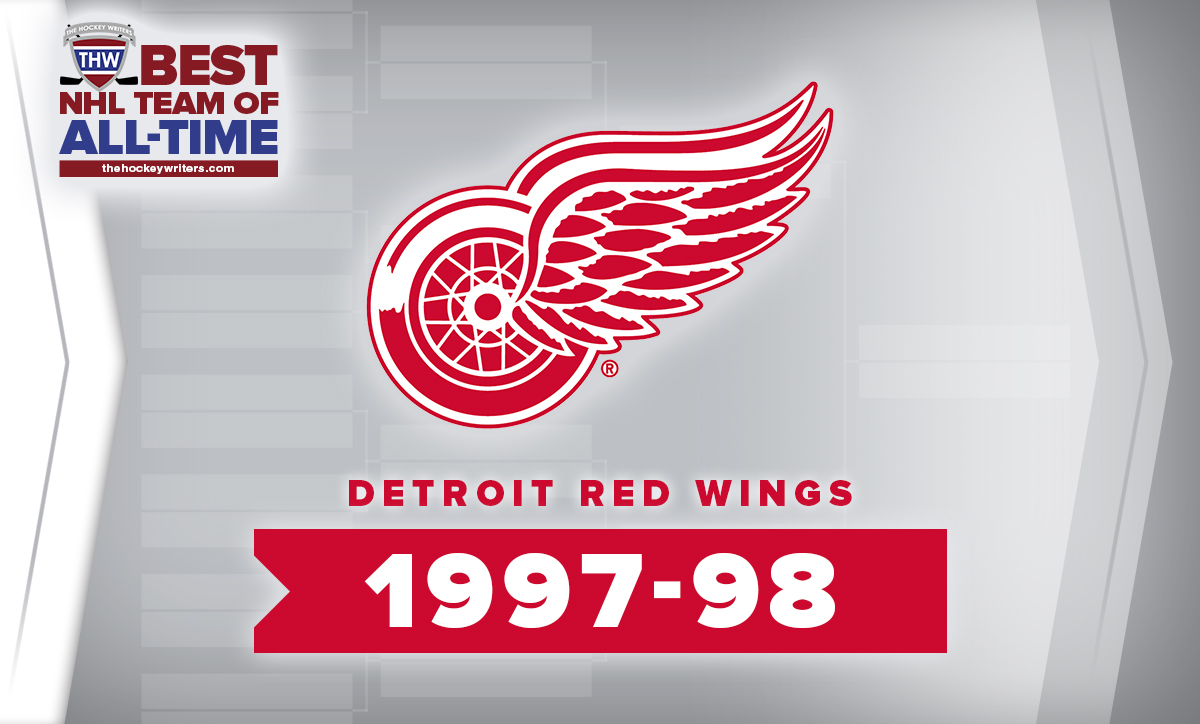
The season after capturing the Stanley Cup, what would the 1997-98 Detroit Red Wings do for an encore? Would they crumble under the circumstances or soar to new heights?
Red Wings Dedicated Season to Fallen Friends
Six days after defeating the Philadelphia Flyers to win the 1997 Stanley Cup, Vladimir Konstantinov, Slava Fetisov, and team massage therapist Sergei Mnatsakanov were involved a serious limosine crash after a team golf outing and celebratory dinner.
“The white stretch Lincoln Town Car limousine, driven by Richard Gnida veered across several traffic lanes, skipped the curb, grazed a metal pole and crashed into a tree,” wrote ESPN’s Greg Garber in 2009. “Gnida was driving with a suspended license after two convictions for drunken driving. Later, he told police he blacked out on Woodward Avenue. When his passengers, who were not wearing seat belts, noticed Gnida had nodded off, they pounded the partition to try to get his attention. Seconds later, they slammed into it.”
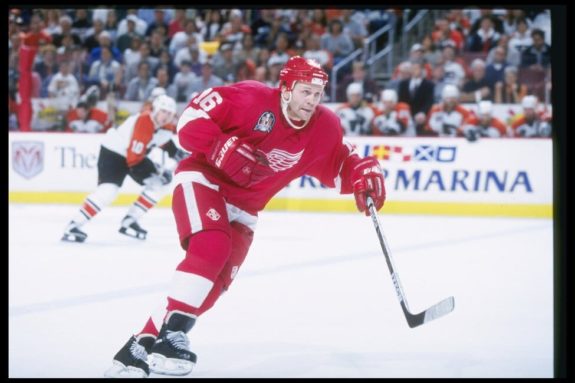
Konstantinov, a rugged and physical defenseman, suffered severe head injuries and fell into a coma. “The prognosis from the very beginning was terrifying,” Konstantinov’s wife Irina Konstantinov said. “His brain was getting more and more swollen, and at one point I remember we were given just a few hours, [doctors] saying that most likely he was going to die.”
Konstantinov survived, but when he awoke, he was unable to speak. His brain had been torn in several places, which disrupted his ability to communicate, destroyed his short-term memory, and made him unable to stay balanced. Needless to say, his hockey career was over.
Mnatsakanov also suffered grave injuries and too spent several weeks in a coma. The crash left him permanently paralyzed from the waist down. Fetisov suffered minor injuries and was able to suit up for the season.
The Red Wings dedicated the 1997-98 season to their pair of fallen friends, donning a “Believe” patch emblazoned with the initials VK/SM.
Red Wings A Deep Team Despite Fedorov’s Holdout
In addition to losing Konstantinov, the Red Wings played most of the season without Sergei Fedorov. Perhaps the most famous member of the Russian Five, Fedorov had twice recorded 100-plus points in a season but held out for the first 59 games before signing a $38-million, six-year deal (from ‘AFTER HOLDOUT, FEDOROV BREAKS THE ICE,’ Washington Post, April 22, 1998.)
Despite having one of their most prolific players suit up for only 21 games, the team was still more than capable, with many notable players in their prime. In addition to the big three of Niklas Lidstrom, Brendan Shanahan, and captain Steve Yzerman, the team also featured Vyachaslav Koslov, Larry Murphy, Igor Larionov, and Chris Osgood between the pipes.
Related: Red Wings’ All-Time Greatest Lines
The team had no fewer than seven eventual Hockey Hall of Famers on the roster: Fedorov, Fetisov, Larionov, Lidstrom, Murphy, Shanahan, and Yzerman.
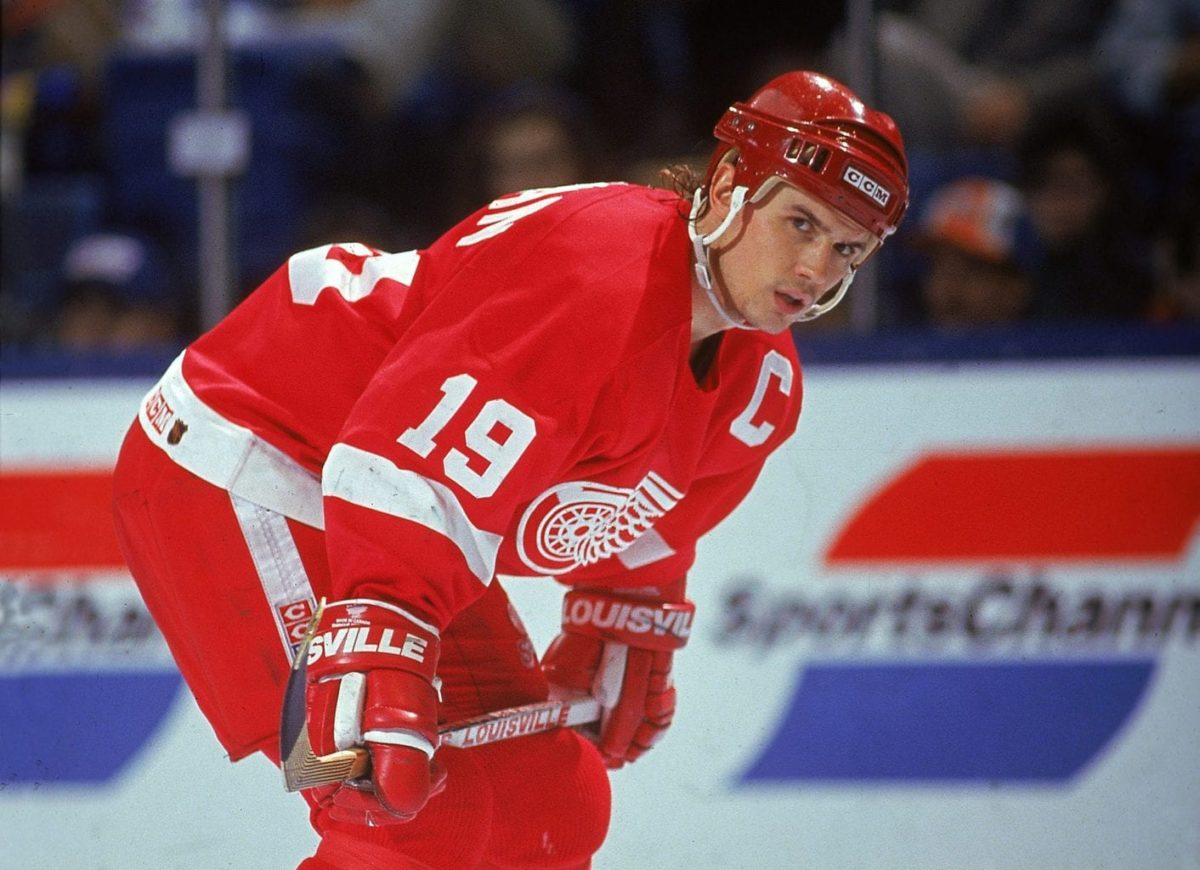
The squad was coached by the supremely successful Scotty Bowman. The winningest bench boss in NHL history by far to this day, Bowman had already won seven Stanley Cups — and was already a Hockey Hall of Fame coach — by the time the 1997-98 season rolled around.
The general manager was rookie Ken Holland, who took the job in July 1997 after serving seven years as director of amateur scouting the past three as assistant general manager. The team Holland inherited was truly built by former general managers Bryan Murray (1990-94) and Jim Devellano (1994–97.)
Top Performers
The 1997-98 Red Wings were balanced, with seven different players recording 40-plus points.
Steve Yzerman paced the club with 69 points (24 G, 45 A.) Behind him were Nicklas Lidstrom with 59 points (17 G, 42 A) and Brendan Shanahan with 57 points (28 G, 29 A.)
In fourth and fifth were Vyachaslav Koslov and Larry Murphy with 52 points each, followed by Igor Larionov in sixth with 47 and Doug Brown in seventh with 42.
In net, Osgood started 64 games and posted 33 wins, a minuscule 2.21 Goals Against Average, .913 SV%, and six shutouts.
Regular Season Recap
The Red Wings got off to a great start in the Central Division, posting a 13-3-4 in their first 20 games. They never lost more than three games in a row all season and had five winning streaks of four-plus games, with their longest being six straight between March 29 and April 11. In that stretch, they surrendered only 10 goals.
The team finished with a 44-23-15 record, good for 103 points and second in the Central, six points behind the Dallas Stars. They scored the second-most goals in the NHL with 250 and allowed a the seventh-least with 196.
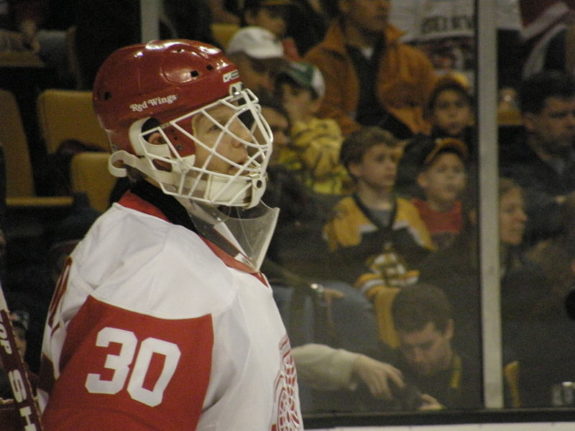
Their power play was a key to their success, as they cashed in 67 times on the man advantage and operated at 17.59 per cent efficiency (sixth in the NHL.) Their penalty kill was also a point of strength as they gave up just 51 goals and operated at 86.44 per cent efficiency (eight in the NHL.)
Awards
Steve Yzerman won his first and only Conn Smythe Trophy as the most valuable player of the Stanley Cup Playoffs (more on that in a moment.)
Four players were named NHL All-Stars. Shanahan suited up for North America, while Fetisov, Larionov, and Lidstrom represented the World.
The Long Grind to the Final
The Red Wings met the Phoenix Coyotes in the first round of the playoffs. After winning Game 1 6-3, the Red Wings lost Game 2 by a 7-4 score and Game 3 by a 3-2 score to fall behind in the series two games to one.
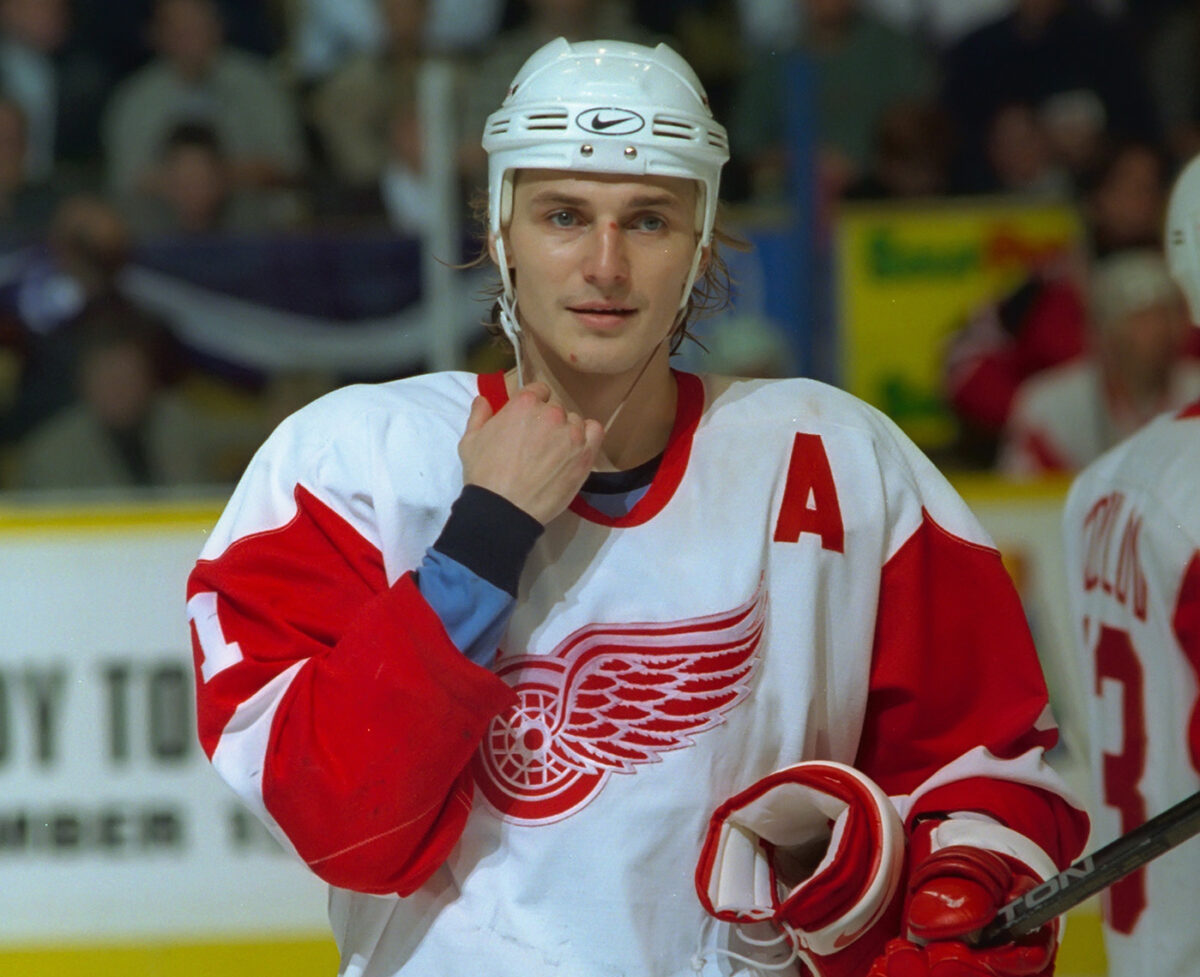
They rattled off three straight to beat Keith Tkachuk’s sophomore club, however, winning 4-2 in Game 4, 3-1 in Game 5, and 5-2 in Game 6.
In the second round, they faced St. Louis Blues in a series that also went to six. The Blues took the first game 4-2 before the Wings won Games 2, 3, and 4. Game 3 went to double overtime and Shanahan played the hero at 11:12 of the second extra frame (see the goal at 9:16 of this video.)
The Western Conference Final was tight and low scoring, with the Red Wings taking Game 1 by a 2-0 score and the Stars responding by winning Game 2 by a 3-1 score. The Red Wings then won Games 3 and 4 to take a 3-1 series stranglehold.
In Game 5, the Red Wings came within a goal of advancing to the Cup Final, but Jamie Langenbrunner scored 46 seconds into overtime to extend the series to a sixth game. In Game 6, however, the Red Wings shut out the Stars 2-0 for the second time in the series. Osgood made 26 saves, Murphy and Fedorov scored, and the Red Wings had a chance for back-to-back championships.
Not Much Drama Against Capitals in Stanley Cup Final
The Red Wings’ opponent was the Washington Capitals. They’d finished 40-30-12, good for third in the Atlantic Division, but had bested the Boston Bruins, Ottawa Senators, and Buffalo Sabres to appear in the first-ever Stanley Cup Final.
It appeared as though the Red Wings were sick of opponents taking them to six games, because they brought out the brooms against Peter Bondra, Adam Oates, and company. The series began with two games at Joe Louis Arena and the Red Wings won both: Game 1 by a 2-1 score and Game 2 5-4 in overtime, with centre Kris Draper scoring in the extra frame on a nifty redirect (see the goal at 10:13 of this video.)
The series went back to Washington, where the Red Wings won Game 3, once again by a 2-1 score. In Game 4, led by Doug Brown’s two-goal performance, they completed the sweep with a 4-1 victory.
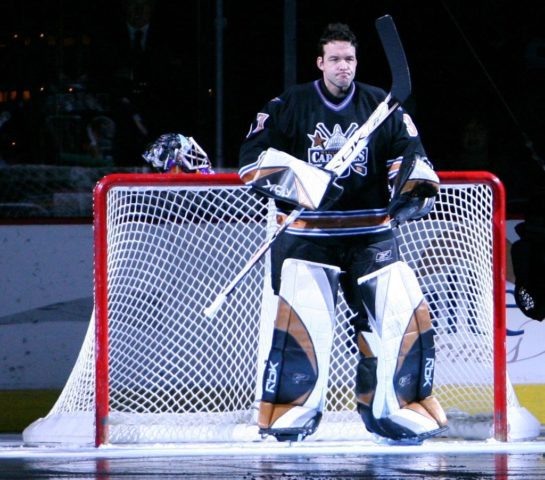
Steve Yzerman was awarded the Conn Smythe Trophy as the most valuable player of the Stanley Cup Playoffs for recording a team- and league-high 24 points (eight goals, 16 assists.)
Red Wings Channeled Difficult Circumstances into Success
“Probably the biggest motivation and the unfortunate of it all was Vladimir Konstantinov,” recalled Kris Draper, who recorded 13 goals and 10 assists for 23 points that season. “Everyone knows about the tragedy that we had six days after we won the Stanley Cup and the accident. Vladdy, he was with us the entire year and especially that playoff run. So the motivation for us going into the Stanley Cup Finals in back-to-back years was definitely Vladdy. He was certainly in our hearts and in our minds and every time we played, he was that extra motivation that we needed.
“For us, we wanted to have an opportunity to become back-to-back Stanley Cup champions and not too many teams and not too many organizations can say that,” Draper continued. “That was something that meant a lot to all of us, especially being able to win in ’97, I think we silenced a lot of critics and a lot of people that questioned our team and questioned how we were built. Now all of a sudden here we are coming into 1998 as the favourites this year, playing the Washington Capitals. So I think for us, the motivation was No. 1, Vladdy, and No. 2, an opportunity to win the Stanley Cup back to back, which was something that certainly meant a lot to all of us.”
Kris Draper on winning back-to-back Stanley Cups
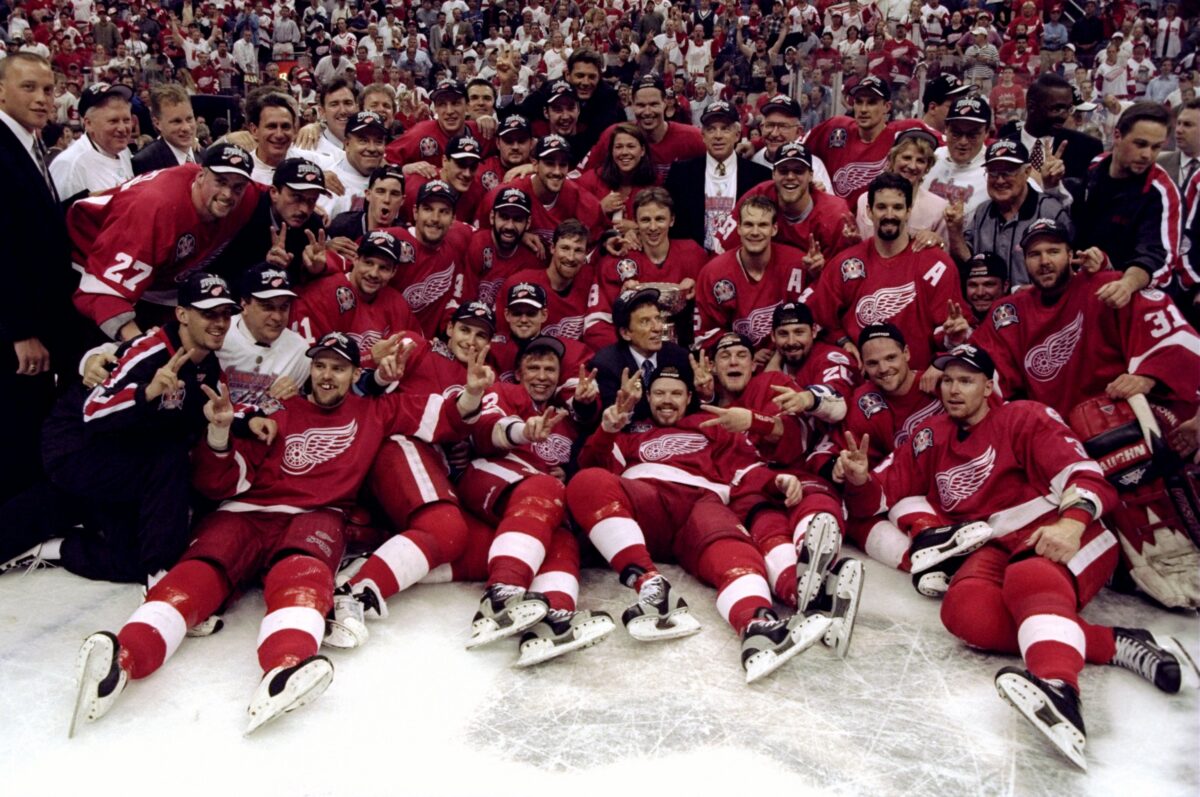
Even Capitals’ head coach Ron Wilson gave the Red Wings their props.
“It’s obviously a very tight-knit group and when they have someone like (Konstantinov) to rally around, I mean, what the heck can we say?” he said. “No speech you can give, no story you can tell can compare to what that team has gone through this year. That was a very emotional, professional thing that they did. You’d only see that in hockey.”
NHL.com’s Dave Stubbs reported that Yzerman had planned to take the Cup from Commissioner Gary Bettman and immediately give it to Chris Osgood. But then Shanahan told Yzerman that Konstantinov would be on the ice with them.
In one of the most moving moments in hockey history, Yzerman gave Konstantinov — a man they’d taken to calling “Vladinator” — the Cup for the first victory lap. Konstantinov also got his name on the Cup.
“A year ago, we were told Vlady might not live and tonight he carried the Stanley Cup,” Yzerman said. “I think that’s pretty special.”
A special moment for a special and tight-knit team. They should certainly be in the conversation as one of the best NHL teams of all time for their determination, for their ability to channel tragedy into success, for their ability to believe.